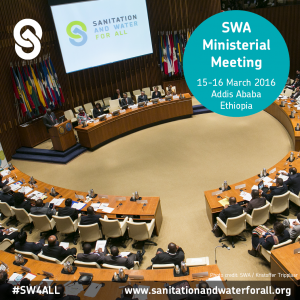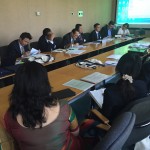Event Summary: Sanitation and Water for All Ministerial Meeting Day One – Leadership and Collaboration
March 16, 2016
 Early Monday morning I found myself in a shuttle bus traveling from Bole International Airport to my hotel. With the fresh morning air coming in through the open window, I took in the view and was excited to see multiple billboards advertising Ethiopia’s support for the new Sustainable Development Goals (SDGs). Indeed, the SDGs are ultimately why I am in Addis Ababa this week, as I am participating in the Sanitation and Water for All (SWA) Ministerial Meeting, which seeks to help governments and other stakeholders take the first step in paving the way for the SDGs.
Early Monday morning I found myself in a shuttle bus traveling from Bole International Airport to my hotel. With the fresh morning air coming in through the open window, I took in the view and was excited to see multiple billboards advertising Ethiopia’s support for the new Sustainable Development Goals (SDGs). Indeed, the SDGs are ultimately why I am in Addis Ababa this week, as I am participating in the Sanitation and Water for All (SWA) Ministerial Meeting, which seeks to help governments and other stakeholders take the first step in paving the way for the SDGs.
My objective this week is twofold: both to provide guidance on how hygiene can be incorporated into country commitments around the SDGs and explore ways for the Global Public-Private Partnership for Handwashing (PPPHW) to support countries in these efforts.

Ministerial Dialogue
Through plenary sessions, ministerial meetings, and knowledge sharing sessions, two strong themes emerged for me today: both political leadership and collaboration will be two keys to SDG success.
The SWA itself is making strides in fostering political leadership. Government representatives from over 30 countries are at the meetings discussing their progress on the MDGs, identifying challenges they face in delivery of WASH, and exploring how to succeed in achieving the SDGs. Political leadership is crucial because WASH is often de-prioritized without strong advocates within government. WASH requires infrastructure investment, certainly, but also partnerships, measurement, and good, evidence-based policies that undergird these. Strong governmental leadership can facilitate these components. Our host country this week, the government of Ethiopia, demonstrated how through the One WASH National Program, strategies were synergized and success achieved at scale. It was only because of strong leadership that this occurred.
In the opening plenary, Anthony Lake, the Executive Director of UNICEF, emphasized that process on SDGs will only come through behavior change—both within communities through improving access to and usage of WASH services—and as a sector through increased collaboration. He emphasized that we must change how we think about water and sanitation in relation to other health systems interventions, such as nutrition. I agree, and the PPPHW has championed dialogue about integration through our involvement with the Clean, Fed & Nurtured Community of Practice.
In addition to these two major themes, one sentiment, also from the first plenary, stuck with me throughout the day. Kevin Rudd, the Chair of SWA and former Prime Minister of Australia, reminded us that behind each statistic about access to WASH lies a human life. Far too often, these statistics also represent a human life lost due to entirely preventable causes. This is the impetus for our gathering in Addis Ababa this week. WASH saves lives, but there is much work to be done if we are to deliver WASH to everyone, everywhere, forever. This is why we need political leadership and collaboration—because the stakes are high and the challenge is too great otherwise.